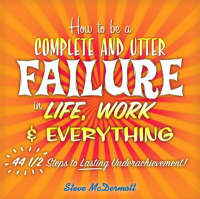
How to Be a Complete and Utter Failure in Life, Work & Everything
Financial Times Prentice Hall (Verlag)
978-0-13-813810-3 (ISBN)
- Titel ist leider vergriffen;
keine Neuauflage - Artikel merken
Steve McDermott’s spent years studying the world’s greatest failures: those extraordinary individuals who’ve spectacularly underachieved in every walk of life. They all use the exact same skills and strategies--and you can learn them, too. (Maybe you know some already!) In this quick, incredibly practical guide to failure, McDermott brings together dozens of state-of-the-art techniques guaranteed to help you crash, burn, and disappoint everyone in your life. In just minutes, discover how to fail at...
• Leadership • Relationships • Personal growth • Achieving happiness
• Teamwork • Planning • Goal-setting • Careers
• Financial security • First impressions • And so much more!
DANGER: Do NOT attempt to reverse these techniques. If performed in the opposite fashion, they may cause spectacular success. The publisher and author will not be held responsible for wealth, happiness, or career achievements resulting from the use of these skills and strategies in reverse.
Steve McDermott is one of the UK’s top motivational speakers, personal coaches, trainers, and consultants. The world’s #1 expert on failure, he’s been featured on everything from CNN to BBC Radio.
Preface
How to get the most from this guide
Introduction
Step One Don’t decide what you want. If you do decide what you want, don’t think about why you want it.
And if you do decide why you want it, commit to believing you can’t have it.
Step Two Don’t do things on purpose
Step Three Don’t stop working for a living
Step Four Don’t know what you value in life (and if you do, lose sight of it)
Step Five Don’t spend any of your time in the future
Step Six Don’t have any goals
Step Seven If you do have goals, don’t put them in writing, and if you do, don’t think too big
Step Eight Don’t plan your priorities
Step Nine Don’t involve other people
Step Ten Don’t have a mentor or be a mentor
Step Eleven Don’t get advice from people you’ve never met or who are dead
Step Twelve Don’t take action right now
Step Thirteen Don’t get feedback on your actions
Step Fourteen Don’t adjust
Step Fifteen Don’t get even more feedback, don’t be flexible…(you get the idea)
Step Sixteen Don’t practice continuous improvement
Step Seventeen Don’t wear a parachute
Step Eighteen Don’t change your beliefs
Step Nineteen Don’t stop having a deep fear of failure and of making a fool of yourself
Step Twenty Don’t take personal responsibility for your life and results
Step Twenty-one Don’t stop believing in luck
Step Twenty-two Don’t expand your comfort zone
Step Twenty-three Don’t use inside-out thinking
Step Twenty-four Don’t put things in before you try to take things out
Step Twenty-five Don’t control your moods
Step Twenty-six Don’t transform your language
Step Twenty-seven Don’t think about the first four minutes
Step Twenty-eight Don’t talk and think about what you want
Step Twenty-nine Don’t go to the movies
Step Thirty Don’t stop being an unthinking dog
Step Thirty-one Don’t ask `How do you do that?’ Don’t act `as if’. And don’t be naïve.
Step Thirty-two Don’t change the meaning of things
Step Thirty-three Don’t stop thinking only about money, money, money
Step Thirty-four Don’t have a good laugh
Step Thirty-five Don’t be creative or innovative
Step Thirty-six Don’t think of your own idea to go here
Step Thirty-seven Don’t stop always taking `no’ for an answer
Step Thirty-eight Don’t be grateful
Step Thirty-nine Don’t commit to lifelong learning
Step Forty Don’t be a leader
Step Forty-one Don’t learn to communicate
Step Forty-two Don’t understand the secrets of great teams and great customer service
Step Forty-three Don’t develop winners and winning relationships
Step Forty-four Don’t step up. Don’t do extraordinary things
Step Forty-four-and-a-half Don’t stop doing everything by halves, that’s if you do anything at all.
| Erscheint lt. Verlag | 10.1.2008 |
|---|---|
| Verlagsort | Upper Saddle River |
| Sprache | englisch |
| Maße | 178 x 178 mm |
| Themenwelt | Sachbuch/Ratgeber |
| ISBN-10 | 0-13-813810-9 / 0138138109 |
| ISBN-13 | 978-0-13-813810-3 / 9780138138103 |
| Zustand | Neuware |
| Haben Sie eine Frage zum Produkt? |
aus dem Bereich


